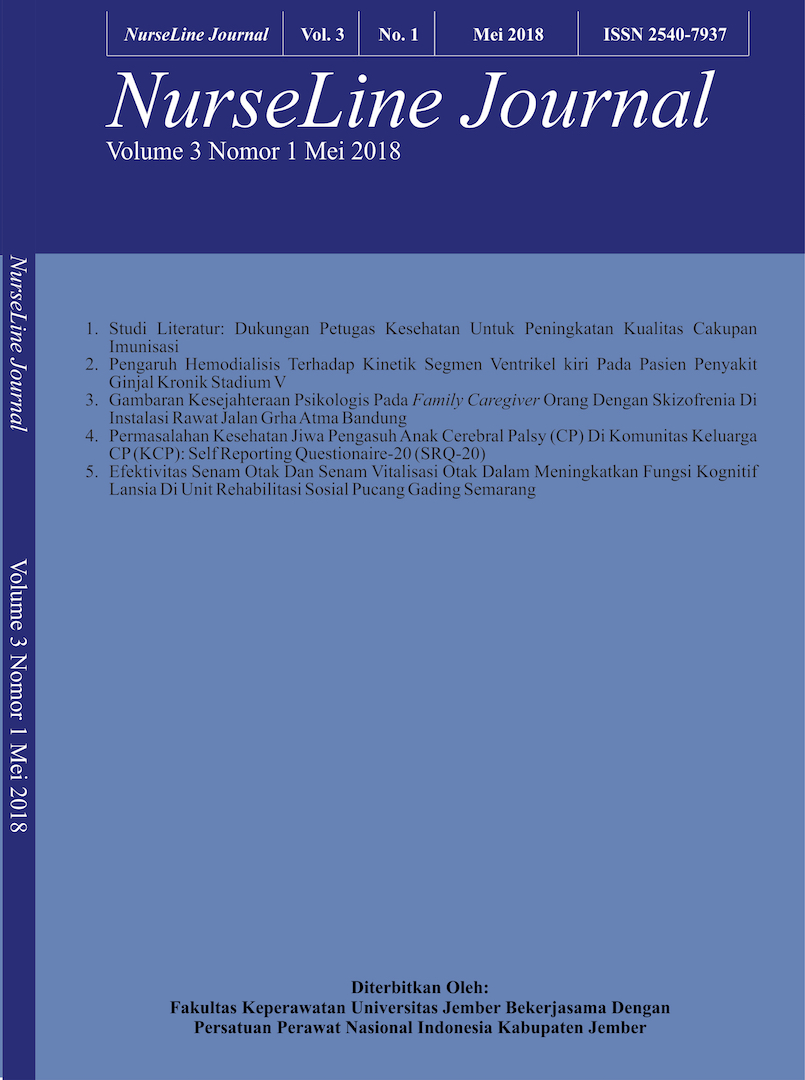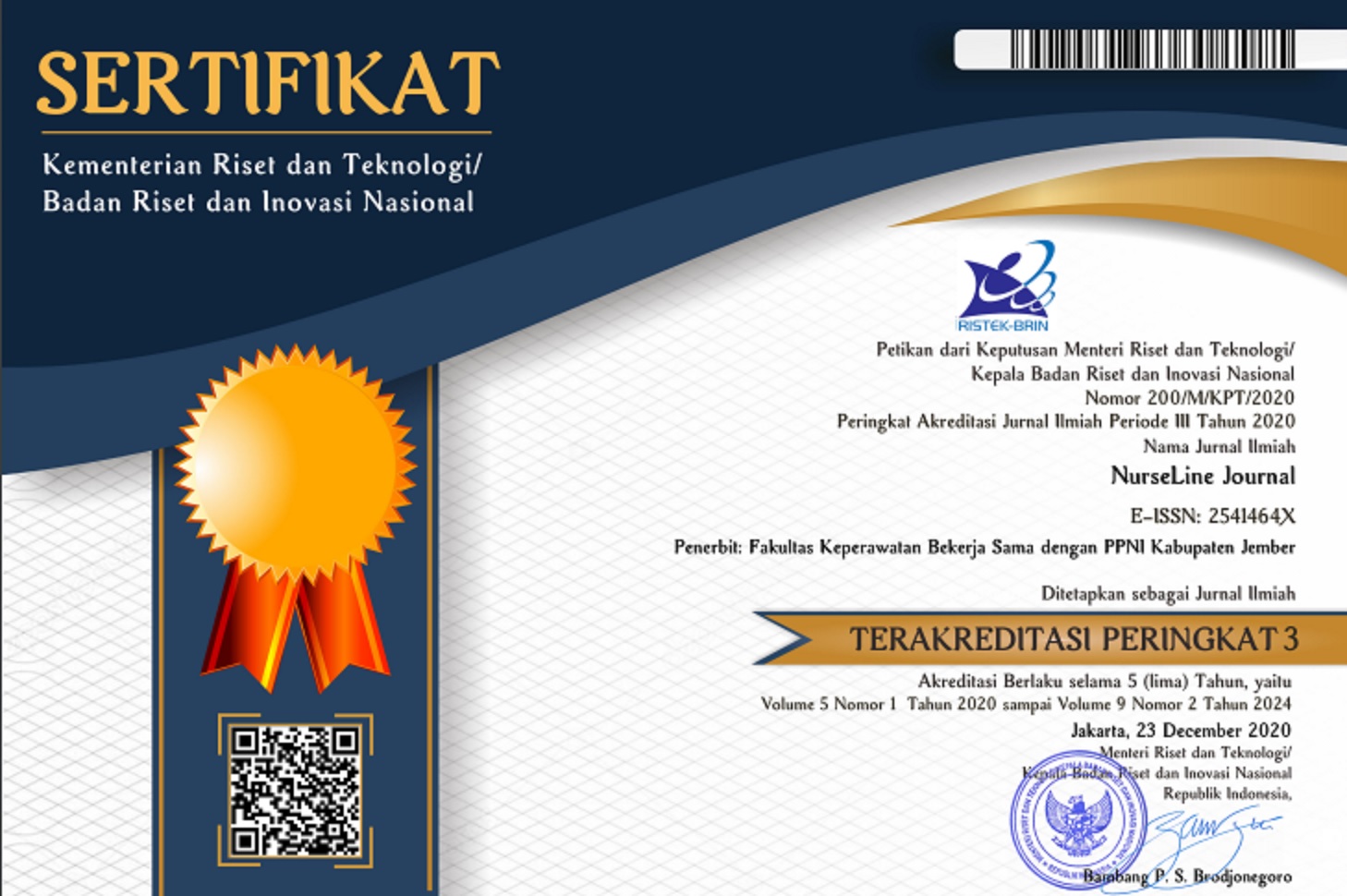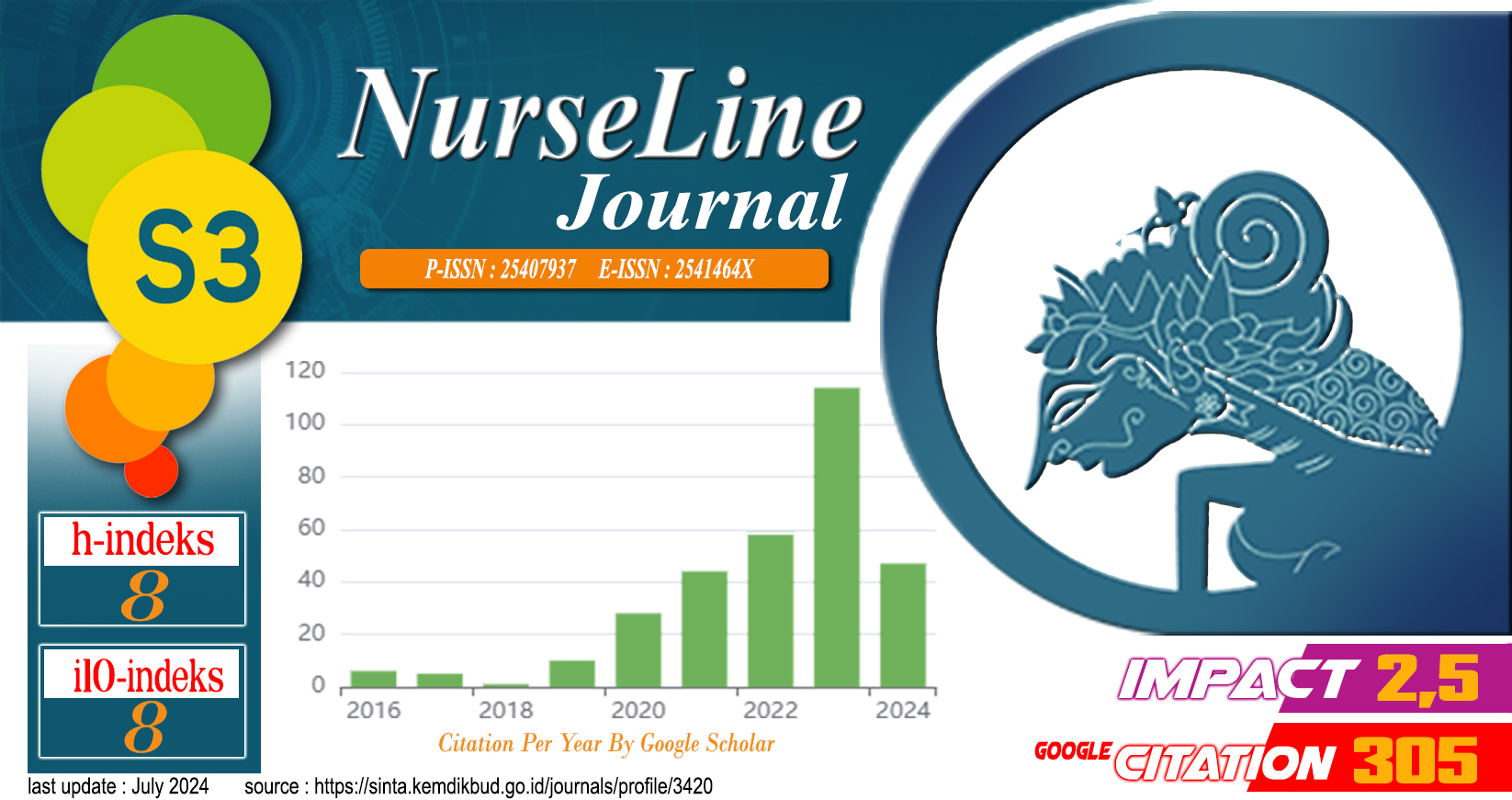The Mental Health Problems of Caregivers of Children with Cerebral Palsy at Self Help Group
Based on Self Reporting Questionnaire (SRQ-20)
Abstract
Children with cerebral palsy (CP) have a high dependency on the activities of daily life (ADL) for a whole life. This can affect mental health and well-being of caregivers of CP. This study aimed to assess the mental health problems in caregiver of a child with CP who joined in self-help group (SHG) at Mojokerto East Java Province, focusing on depression symptoms. Using total sampling approach, the family member who has a role as caregivers of a child with CP were chosen and enrolled in a descriptive study, counted 37 respondents. The self-reporting questionnaire -20 (SRQ-20) with Cronbach alpha value 0.84 was used to measure their mental health status. SRQ-20 is also available in the Indonesia Ministry of Health's online application.This study shows that the majority caregiver role is a mother (94,6%). 40.5% caregiver has a risk of mental health problems that require counseling by a health professional. Caregiver experienced several complaints both physical, psychological, and social. Perceived physical complaints include frequent headaches (40.5%); difficulty sleeping (45.9%); indigestion is disturbed (29,7); tired easily (37.8%); and a bad taste in the stomach (40.5%). While the psychic complaints experienced by the caregiver on average feel tense, anxious or worried (37.8%); difficult to make decisions (35.1%); and found it difficult to enjoy daily activities (24.3%). There are 2 caregivers who have the idea of suicide. These complaints are a form of response to stressors (caring for children with CP) which is a manifestation of signs and symptoms of mental health problems among them. These signs and symptoms indicate that caregivers are susceptible to depression, anxiety, helplessness, and despair. Caregiver of children with CP is a vulnerable population to psychiatric problems because of its role in fulfilling daily life care of a child with CP for a long time even a lifetime. Nurses can contribute to providing informational and emotional support to help the caregiver to achieve mental health and well-being.
References
Ahmadizadeh, Z., Rassafiani, M.A., Khalili, & Khani, M.M. (2015). Factor associated with quality of life in mother of childern with cerebral palsy in iran. Hongkong Journal Of Occupational. 25:15-22.
Arneson,C.L.,M.S., Durkin., R.E. & Benedict. (2009). Prevalence of cerebral palsy: Autism and Developmental Disabilities Monitoring Network. United States Journal of Disabil Health.2: 45-48.
Brown,O.,dan D.Elkoni. 2010.Resilience In Families With A Child Diagnosed With Cerebral Palsy. International Jornal Of Nelson Mandela Metropolitan University.
Kementerian Kesehatan RI. (2017). Deteksi dini apa yang terjadi di lingkungan saudara: Self Reporting Questioner-20. Diakses melalui http://sehat-jiwa.kemkes.go.id/deteksidini/15.
Herdman, T.H. & Kamitsuru, S. (Eds.). (2014). NANDA International Nursing Diagnoses: Definitions & Classification, 2015–2017. Oxford: Wiley Blackwell.
Lima, M. B. S., Cardoso, V. S., & Silva, S.S.C. (2016). Parental Stress and Social Support of Caregivers of Children With Cerebral Palsy. Paidéia, 26(64), 207-214 doi:10.1590/1982-43272664201608
Maramis,W.F. (2005). Catatan Ilmu Kedokteran Jiwa. Surabaya: Airlangga University Press
Maryam,O.C., Franzina., D, & Jonathan. (2013). An update on the prevalence of cerebral palsy: a systematic review and meta-analysis. Developmental Medicine And Child Neurology. 55:509.
Olawale,O.A., Deih.,A.N, & Yaadar, R.K.K. (2013). Psychological impact of cerebral palsy on families:the african perspective. Journal of Neurosciences in Rural Practice. 4(2):159-163.
Ribeiro, M.F.M., Sousa, A.L.L., Vandenbenghe, V., & Porto. C.C. (2014). Parental stress in mothers of children and adolescents with cerebral palsy. 22(3):440-7.
Stuart, G. W. (2013). Principles dan practice of psychiatric nursing. USA Missouri: Elsevier
Undang-undang RI no. 18 tahun 2014 tentang Kesehatan Jiwa
Undang-Undang RI No. 08 Tahun 2016 tentang Penyandang Disabilitas.
Varcarolis, E.M., & Halter, M.J. (2010). Foundations of psychiatric mental health nursing: a clinical approach 6th edition. USA Missouri: Sauders Elsevier
Vicentic, S. (2016). Burnout of Formal Caregivers of Children with Cerebral Palsy. Isr J Psychiatry Relat Sci - Vol. 53 (2):10-16 dapat diakses melalui: www.ijsrp.org/research-paper-1115/ijsrp-p47104.pdf
Westhuizen, C. V., Wyatt, G., Williams, J.K., Stein, D.J., & Sorsdahl, K. (2016). Validation of the Self Reporting Questionnaire 20-Item (SRQ-20) for Use in a Low- and Middle-Income Country Emergency Centre Setting. Int J Ment Health Addict. 14(1): 37–48. doi:10.1007/s11469-015-9566-x.1 diakses melalui : https://www.ncbi.nlm.nih.gov/pmc/articles/PMC4779367/pdf/nihms704144.pdf
Yamaoka,Y., Tamiya,N., Moriyama,Y., Sandoval Garrido, F.A., Sumazaki. R., & Noguchi, H. (2015). Mental Health of Parents as Caregivers of Children with Disabilities: Based on Japanese Nationwide Survey. PLoS ONE 10(12):1-14; e0145200. doi:10.1371/ journal.pone.0145200, diakses melalui: https://www.ncbi.nlm.nih.gov/pmc/articles/PMC4686893/, 11 Maret 2018
















